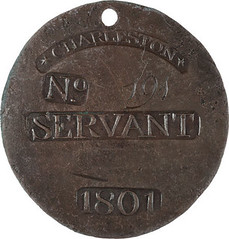
PREV ARTICLE
NEXT ARTICLE
FULL ISSUE
PREV FULL ISSUE
SLAVE HIRE BADGES OF CHARLESTON, SOUTH CAROLINA
On May 18, 2015 Heritage will auction the Isaac Rudman Collection of Slave Hire Badges and Anti-Slavery Medals. Here's an article by
Michael Riley from the Heritage Coin News email newsletter of May 9. -Editor
Their system allowed a slaveholder to pay a license fee, good for one year at a time, on a sliding scale based on the occupation. In return, he would receive a copper tag or badge for each slave licensed. The master was then allowed to hire that slave out to private individuals, businesses, or even the municipal government with the proviso that the slave would wear the badge at all times when on one of these hire out jobs and that the slave could only perform the function he was licensed to perform. Who benefited from this? The city made thousands of dollars a year in badge fees; the slaveholders made extra money for hiring out slaves that they had no work for at the time; the slaves themselves were often allowed to keep part of their outside wages plus they were given a certain amount of freedom in exchange for their skills. What were the occupations that are found on these badges? "Servant" is the most common with maybe 60% of the surviving badges bearing that designation. The next most common is "Porter" at roughly 20% of the extant examples. These were considered unskilled or semi-skilled trades and the licensing fees were much lower than the rest. The most "common" of the skilled occupations is "Mechanic" which accounts for about 10% of known badges. The rarest are "Fruiterer", "Carpenter", and "Fisher." Others are thought to have been issued but no confirmed examples survive. Slave-related memorabilia is a large and popular area of collecting interest. It's interesting to note that these Charleston slave hire badges are really the only things a collector can obtain that can absolutely be guaranteed to have been owned and worn by a slave. The year it was used, the occupation and the location of the slave wearing it can easily be determined. The selection of authentic slave hire badges in this auction is extensive and includes rare occupations. Truly an historic offering! To view the lots online, see:
Wayne Homren, Editor The Numismatic Bibliomania Society is a non-profit organization promoting numismatic literature. See our web site at coinbooks.org. To submit items for publication in The E-Sylum, write to the Editor at this address: whomren@gmail.com To subscribe go to: https://my.binhost.com/lists/listinfo/esylum All Rights Reserved. NBS Home Page Contact the NBS webmaster 
|
